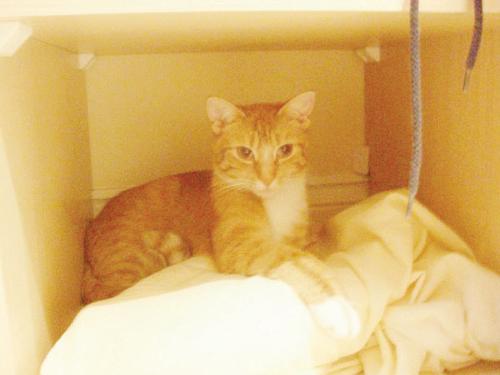The sight of skinny cats in dumpsters, scavenging for food is unfortunately a common sight in Saudi Arabia, where big cities and small towns alike suffer from severe cat overpopulation. Made up of stray cats, abandoned by families who did not want or could not take care of them anymore and the majority, feral cats, too poorly socialised to be handled and placed into a typical pet home.
When Umm Asma moved to Jeddah, Saudi Arabia two years ago from the United States, she was extremely shocked and emotionally moved by the very evident problem. This raw emotion later fuelled her to set up the charity organisation ‘Gus’s Hope’ in honour of a ginger street cat who stole her heart.
‘Gus’ who she spotted outside her hotel looked sickly, but determined to rescue the little cat, she hid him under her clothes and snuck him into her room. Umm feared for the Gus’s life, but to her surprise he did not die, but instead grew into a strong and beautiful tomcat who now resides happily with Umm and her family.
Joining Umm on her animal welfare mission is her American friend Farah who currently has 50 cats in her home and together they have started a Trap-Neuter-Return (T.N.R.) program to catch street cats, spay or neuter them, and return them to the streets or place them in foster homes until someone adopts them. Once taking in nine kittens in one week, Umm and Farah are certainly dedicated to the cause and are very positive animal welfare role models, in a country where animal rights are almost unheard of.
Sonja Svensek, another individual attempting to fight for animal rights in the country, noted the absence of any official animal charity organization in Saudi which urged her to create a group ’Pets in Need’, or simply P.I.N. in 2008 enabling like-minded people help the animals,. “To be the change we want to see in others, we have to be productive and active and not expect that someone else will do it” Svensek said.
While P.I.N started as a small group on Facebook and is based in Jeddah, it grew out to more than 2,000 members from all over the country who give each other tips and advice, go out to rescue animals off the street, and spread the word. Like Umm Asma, Svensek believes education on how to treat animals correctly and on the responsibility it takes to care for a pet plays a major role in changing the situation. Pet shops are not being inspected, Vet clinics often operate without a license to obtain medications or anesthetics and there is a severe lack of qualified vets. On top of this there is no awareness among the population on how to treat animals and this lack of infrastructure leads to horrifying stories on pet abuse. The only way thousands of distressed animals in the country can have a better future is by enhancing awareness, enacting regulations concerning animal treatment, including punishment for those breaching the laws, according to the women. Both women stress that trying to get rid of the cat epidemic by pest control or poisoning them is both cruel and useless.
To read the full report click here

